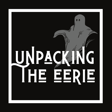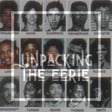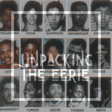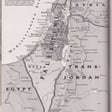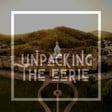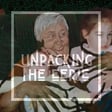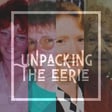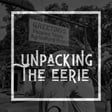Introduction to 'Unpacking the Eerie'
00:00:07
Speaker
And you're listening to Unpacking the Eerie.
00:00:10
Speaker
A podcast that explores the intersections of our dark and morbid curiosities through a social justice lens.
00:00:29
Speaker
This episode was recorded on Thursday, October 26th.
00:00:41
Speaker
We are recording on my phone, so the sound might not be as crisp, so sorry about that.
00:00:47
Speaker
Well, we felt like during this time...
Discussing Genocide in Palestine
00:00:55
Speaker
we could use our platform, the platform that we have in some kind of way to talk about the genocide that's happening in Palestine.
00:01:09
Speaker
I think since we started this project, I've been in the back of my head trying to find openings to insert
00:01:19
Speaker
palestine and it just the tangents never really happened um and then akshu was like well genocide is like the most eerie thing that i think it i think it really embodies the the ugliest parts of humanity and so yeah so we don't need some individual story to make some loose connections it's uh
00:01:44
Speaker
It's a story in and of itself.
00:01:46
Speaker
And it is very eerie to honestly watch people just...
00:01:53
Speaker
not have any sort of reaction to it or like very strongly justify the mass murder of people.
00:02:04
Speaker
It is very eerie to watch that.
00:02:06
Speaker
And yeah, I'm like slowly losing my faith in some humans.
Resources and Action for Palestine
00:02:13
Speaker
So I guess maybe we should start with who this is for and who this is not for.
00:02:17
Speaker
If this is a brand new topic to you, if you're just coming into this and you're like, what the fuck is going on?
00:02:23
Speaker
We really encourage you to pause this episode and choose one of the resources we provided to you in the description before coming back.
00:02:34
Speaker
That will give you at least some context because we're not going to go into that here when people have already done that many times.
00:02:45
Speaker
So this is not for folks who've been knowing.
00:02:50
Speaker
Mostly, I think we want to spend our energy uplifting Palestinian voices.
00:02:55
Speaker
And so we've been compiling a resource list, a checklist that we'll be including in the description to make it easy and not just categorize the learnings or the taking action, but also you can copy it to your drive and physically check off what you have.
00:03:36
Speaker
So this is for people who are feeling inundated with information and don't know what to do with it.
00:03:41
Speaker
This is for people who are newly awakening and shocked and angry and want to figure out how, where to start.
The Power of Collective Action
00:03:52
Speaker
It's for, I mean, I think it's for anyone who is like seeing and hearing about what, what is taking place in Palestine and feeling very powerless on what they can do there.
00:04:04
Speaker
There are things that you can do.
00:04:05
Speaker
And even if it feels like it doesn't matter, it does matter.
00:04:09
Speaker
And we're all like, you know, part of a collective of people that is moving in a direction.
00:04:17
Speaker
And so it might not feel like your individual actions are going to do anything.
00:04:22
Speaker
But like, remember that you're a part of a collective group of people that we're all pushing towards one thing.
00:04:27
Speaker
So it does matter a lot.
00:04:29
Speaker
And I know it can feel very overwhelming to like be inundated with this amount of information and also see a lot of like really intense violence taking place.
00:04:40
Speaker
And, you know, the oppressive powers really benefit from us falling into like a shutdown state of despair.
00:04:48
Speaker
So like try to be mindful of your nervous system so that when you're feeling yourself going there, you can feel
00:04:56
Speaker
take breaks as necessary to sustain yourself you know um that is that it's important as well and there's a difference between like you know oh i'm just gonna check out entirely because this is too hard like that's that's not helpful and like figuring out how to sustain yourself in a way that you can continue to be engaged while not not like putting yourself in such a state of shutdown that you feel like you have to check out you know
Mindfulness and Trauma Awareness
00:05:24
Speaker
And I was noticing a post floating around about how I'm just noticing that a lot of people who are being very vocal about the violence that's happening in Palestine are also people who have experienced a great deal of trauma themselves.
00:05:40
Speaker
And so just being really mindful of that.
00:05:43
Speaker
Your nervous system, yeah, not shutting down, like not being so disconnected from your body that all of a sudden you find yourself in a state of numbness and in a freeze place because we're not useful there.
00:05:59
Speaker
And that's where clearly a lot of people are because that's where this ability to just engage in your normal day-to-day while this is taking place.
00:06:10
Speaker
That's why that happens is because people are numb and dissociated.
00:06:16
Speaker
So this isn't going to be long, but we wanted to share some things and invite you to, if you haven't been engaged, engage.
Critique of Media and Propaganda
00:06:24
Speaker
If you are feeling disconnected to re-engage and to, I don't know.
00:06:32
Speaker
I feel it important to notice that there are as mostly white people, but it's not only white people.
00:06:40
Speaker
that are being exceptionally silent online about a genocide that is happening.
00:06:47
Speaker
And I'm also noticing a lot of tiptoeing around language.
00:06:51
Speaker
And that's not helpful.
00:06:53
Speaker
What the fuck's going on?
00:06:55
Speaker
That's not helpful either.
00:06:56
Speaker
When mass media outlets and news outlets are using language in a very intentional way.
00:07:08
Speaker
aware that like there's a lot of propaganda being fed out via the news and via social media then I am telling you there's a lot of propaganda being fed out via news and via social media and some of our resources are related to propaganda and I just want to
00:07:31
Speaker
Define that for people, propaganda is the spreading of ideas, information, or rumor for the purpose of helping or injuring an institution, a cause, or a person.
00:07:44
Speaker
So I really, really encourage people to just like tap into your critical thinking skills because you all have them, you know, and just ask yourself where things are coming from and like why they might be saying certain things and just do your own research.
00:08:03
Speaker
You know, you have access to the Internet for a reason.
00:08:06
Speaker
And we've done a lot of that research for you.
00:08:09
Speaker
And, you know, take a look at the resources that we're sharing so you don't have to do that work yourself.
00:08:15
Speaker
But yes, there is an article, Propaganda 101, How to Defend a Massacre.
00:08:20
Speaker
And I mean, the patterns throughout history are really unmistakable, but we have amnesia, I guess.
00:08:29
Speaker
Someone had posted today, I want you when you're watching the news to pay attention to the people who are trying so hard to defend why they're killing.
00:08:38
Speaker
And then juxtapose that with who is begging to be saved or to live.
00:08:46
Speaker
And I think that that in and of itself displays a power dynamic that you don't need expertise to discern.
00:08:55
Speaker
And I think there's a lot of silence too, like, oh, I don't know enough.
00:08:58
Speaker
Oh, I just learned about this.
00:08:59
Speaker
Or, oh, there's a lot
Genocide and Apartheid: A Historical Context
00:09:03
Speaker
You don't need to be an expert on the history of Israel and Palestine to be unequivocally against genocide.
00:09:13
Speaker
That's uncomplicated to be against apartheid.
00:09:16
Speaker
That is uncomplicated.
00:09:18
Speaker
There is an unreal amount of evidence that shows that this is happening.
00:09:25
Speaker
There is a resource that we've listed on the 10 stages of genocide and how each category fits very fits perfectly.
00:09:34
Speaker
the occupation of Palestine fits very neatly into all of these categories.
00:09:38
Speaker
And I was looking online and the genocide watch, like the international page, warned that Palestine was at stage six in May of 2023.
00:09:52
Speaker
There are very obvious patterns to be found among genocides that have taken place in history.
00:10:02
Speaker
For example, the genocide of indigenous people, the land of the country that we are in right now.
00:10:11
Speaker
This place where all these institutions are like land acknowledgements.
00:10:16
Speaker
For some reason, they stand with Israel.
00:10:19
Speaker
And there is something really going on right now where like maybe some of y'all can make connections to abusive relationships and domestic violence.
Power Dynamics and Misconceptions
00:10:29
Speaker
There is an obvious power dynamic that is present.
00:10:32
Speaker
It is very, very obvious if you do a very small amount of research.
00:10:39
Speaker
There is a very obvious power dynamic of who is the
00:10:42
Speaker
oppressor and who is being oppressed and who is doing the gaslighting.
00:10:46
Speaker
There is something wild going on with anyone saying that they are supporting Palestine or pro-Palestine being told that they are anti-Semitic.
00:10:54
Speaker
When there are large groups of Jewish people, like Jewish Voices for Peace, for example,
00:11:02
Speaker
who are very pro-Palestine as well, because they're anti-Zionists.
00:11:06
Speaker
There are such a thing as anti-Zionist Jews.
00:11:09
Speaker
And you can look in our resources to find some podcast episodes on a brief history of Jewish anti-Zionism and what Zionism is.
00:11:21
Speaker
But I will also say that the definition of a Semite is a member of any number of people
00:11:28
Speaker
of ancient Southwestern Asia, including the Akkadians, the Phoenicians, Hebrews, and Arabs.
00:11:38
Speaker
who is a member of a group that speaks a Semitic language that includes Arabic, that statement just doesn't make any sense either.
00:11:48
Speaker
And it's a way to shut down people, you know?
00:11:51
Speaker
And I really encourage you to try to find the connections between this larger thing that's happening and like smaller scale abusive relationships because...
Narratives and Misrepresentation
00:12:02
Speaker
there's very, very clear signs that exist there as well.
00:12:06
Speaker
And like Shana said, like when someone's in an abusive relationships, it's sometimes very easy to tell who, who is the abuser and who is like being harmed because the abuser has to do a lot of work to convince you.
00:12:24
Speaker
Of a different story.
00:12:26
Speaker
You know, we did an episode of,
00:12:31
Speaker
on Lorena Bobbitt in collaboration with Woman Inc., a domestic violence organization in San Francisco that I have been in community with for a long time.
00:12:42
Speaker
But, you know, Lorena Bobbitt, the story starts with her
00:12:49
Speaker
chopping this dude's dick off, right?
00:12:51
Speaker
Like her, her, her, she, she's in the media as this wild ass woman who just in a fit of rage, cut her boyfriend's dick off and threw it out the window.
00:13:04
Speaker
And that's the story that you get.
00:13:06
Speaker
And so she's crazy.
00:13:07
Speaker
And then there's all these narratives about, there are all these racist tropes about her being Latina.
00:13:12
Speaker
And then when you unravel the story, you learn that she was being,
00:13:17
Speaker
severely abused by this man who was threatening her immigration status, who was severely sexually abusing her, who made her feel like he was omniscient and omnipotent, that he was always present and always knew what she was doing and would go into these cycles and cycles and cycles of abuse that would make her feel trapped.
00:13:39
Speaker
And so now with the context, that moment is not just the moment.
00:13:43
Speaker
The moment is a response to severe abuse.
00:13:46
Speaker
And I see that a lot here.
00:13:51
Speaker
I see that a lot here.
00:13:53
Speaker
Like taking the individual dynamics and scaling out to actually see how abusive relationships are really just microcosms of abusive state powers.
00:14:05
Speaker
Like we get that from somewhere.
00:14:09
Speaker
I want to also uplift an article and really encourage people
00:14:16
Speaker
everyone who is listening to read it.
Information Discernment and Responsibility
00:14:20
Speaker
It is an article that came out a couple days ago from The Cradle, which is a...
00:14:28
Speaker
newspaper, it's an independent newspaper that covers just the region of the Middle East.
00:14:35
Speaker
So they don't have financial ties to large institutions.
00:14:39
Speaker
And they conducted an investigation on what took place on October 7th.
00:14:45
Speaker
And they found evidence that up to half of the Israelis that were killed were police officers or in the military.
00:14:54
Speaker
were not civilians, and that the Israeli forces were also responsible for some of their own civilian deaths, and that false information was disseminated around the quote-unquote atrocities to justify the current devastation that the Israeli government and military is engaging in towards Palestinian civilians in Gaza.
00:15:22
Speaker
It goes through in detail debunking the misinformation.
00:15:26
Speaker
So I really, really encourage you to read this, the cradle investigation that was done by journalists who are risking their lives to bring you this information because of how much mis and disinformation is being spread on the internet.
00:15:43
Speaker
So, you know, do them a favor and read the work that they are writing because it's for you.
00:15:50
Speaker
It's for us, you know.
00:15:54
Speaker
This is all for non-Palestinians.
00:15:59
Speaker
These are all for really the eyes of the Western world because everyone else seems to know fucking better.
00:16:06
Speaker
But all of these articles being written in English, all these videos being translated in English, all of these Palestinians who are speaking English in the midst of a severe crisis, that is not
00:16:19
Speaker
That is for the Western world to see what is happening, to convince, to really audition for sympathy.
00:16:29
Speaker
And for someone to, you know, for people to stand up against this so it stops.
00:16:39
Speaker
It's really, really, I don't know.
00:16:41
Speaker
I've really, once I start going down a rabbit hole, I feel really speechless because I am really struggling with this idea that the average person could be subjecting themselves to such...
00:16:59
Speaker
Like to watching someone be so harmed and to not feel compelled to do anything about it and to be inundated with it and feel like you could go about your day and everything is chill and it's not your moral responsibility to do something about it or to sit in your fear that it's going to upset somebody or it might jeopardize your job or I don't know what people are carrying when they're afraid to speak up or...
00:17:29
Speaker
be committed to taking action, but it's really an act of privilege.
00:17:36
Speaker
People are risking their lives to share their stories with us.
00:17:40
Speaker
And the least we could do is listen and share.
00:17:44
Speaker
The least you can do is listen and read.
00:17:46
Speaker
And like, it's also just like, you know, this is for anyone who is part of the,
00:17:58
Speaker
ancestry that has experienced colonization.
00:18:00
Speaker
This is, this is about you, right?
00:18:03
Speaker
Your ancestors have experienced this.
00:18:05
Speaker
You carry this in your body, whether or not you're aware of it, you know?
00:18:10
Speaker
So seeing it might be triggering something in you that feels really bad and terrifying, but just ask yourself, like, what would your, what would your ancestors want you to do?
Cultural Erasure in Genocide
00:18:23
Speaker
You know, I've been thinking about how part of the act of, I mean, we look at genocide from a really like literal standpoint, like the literal decimation of a people and a place.
00:18:34
Speaker
But I don't think what people are thinking about is how spiritual that is, how it's a spiritual dislocation, how orphaned children who no longer have access to their parents, their grandparents, anybody in their family are getting cut off from pathways to their cultural ties, to historical memory, to
00:18:53
Speaker
ancestral wisdom and joy and all of that lives in like the mundane too like like your mom used to always do that or you have your uncle's laugh or your great grandma used to love music like that you know like all of those things those opportunities they're gone and I think that genocide as we've seen it happen over and over and over it's not just about
00:19:22
Speaker
Literally killing people like that is true.
00:19:25
Speaker
But what goes with that is cultural memory.
00:19:28
Speaker
It's making the world feel like people never existed.
00:19:35
Speaker
And then making this few survivors that are left, making them forget who they are.
00:19:44
Speaker
And so in a lot of ways, going back to Akshi's point about lineage and if you are in a body who carries a lineage that has been colonized, there is something, there's some kind of reclamation happening when you see this happening and you name it for what it is.
00:20:04
Speaker
And also be like, I did not forget who I am.
00:20:06
Speaker
And we talk about trauma and we talk about intergenerational trauma and historical trauma and how experiences of trauma continue on for seven generations.
00:20:21
Speaker
And if you think about that, that's like that could be that's almost like a millennium of how long that impacts people for.
00:20:32
Speaker
So it feels like right now, you know, but I keep thinking about how even if it ends today, right now, a huge amount of damage over a huge proportion of time has already been done.
00:20:45
Speaker
There are a lot of very basic like calls to action that are being made right now that you can engage in.
Practical Steps for Advocacy
00:20:52
Speaker
Some of these, you like literally most of them, you do not need to leave your house to do things.
00:20:59
Speaker
So we're going to support you through engaging in some actions.
00:21:04
Speaker
So don't listen to the episode all the way without pausing when you need to.
00:21:09
Speaker
And I know people have phone anxiety and that's real, but you could pretend we're here with you.
00:21:17
Speaker
And you can practice a few times.
00:21:18
Speaker
I have phone anxiety and I called someone and, um, they just listen and take your name down.
00:21:24
Speaker
If that's helpful for people to hear, cause they don't do not have time to have a long winded conversation with you.
00:21:31
Speaker
Um, but you calling does matter cause you get added to, to the number of people that have called.
00:21:37
Speaker
So you can contact your reps.
00:21:40
Speaker
So pause and do one of these three things, go to the list and,
00:21:46
Speaker
and either go to the pre-written email or go to five calls or go to resist bot.
00:21:55
Speaker
The pre-written emails are so easy.
00:21:58
Speaker
tinyurl.com forward slash defund Israel.
00:22:03
Speaker
It's all populated for you.
00:22:07
Speaker
They have listed in categories,
00:22:11
Speaker
The states and then every single representative tied to all the states, you click on their names, it auto-populates a long email, actually a really comprehensive email about the asks.
00:22:23
Speaker
Not just demanding ceasefire and not just demanding...
00:22:28
Speaker
the not just demanding there's an opening for humanitarian aid, but overall to stop funding Israel and to demand an end to the occupation.
00:22:39
Speaker
And inside it, there's also kind of like a threat.
00:22:43
Speaker
Like if you do not do this, like I am paying attention to who
00:22:48
Speaker
is standing up for Palestine and I will not be voting for you in the next election if you don't show up.
00:22:55
Speaker
And I think a lot of people organizing this are saying the same, like that's really effective to kind of be like, I am paying attention.
00:23:02
Speaker
I will not vote for you.
00:23:08
Speaker
The app five calls is very quick and easy to you click on the issue that you want to address.
00:23:15
Speaker
It gives you your representatives.
00:23:17
Speaker
You click on the representatives.
00:23:18
Speaker
They auto populate a script for you to read directly.
00:23:21
Speaker
It's written by other people.
00:23:22
Speaker
So if you have a distinct ask, I would prepare a script before, but it's very simple.
00:23:27
Speaker
And sometimes it just routes you to voicemail.
00:23:31
Speaker
And even if a person picks up
00:23:34
Speaker
Like, it's going to be a very short conversation.
00:23:39
Speaker
So... You got this.
00:23:40
Speaker
Calls are most effective.
00:23:42
Speaker
Prioritize calling.
00:23:44
Speaker
And then ResistBot is a text-based thing.
00:23:49
Speaker
You just have to send the word resist to 50409.
00:23:52
Speaker
And it'll give you an option to...
00:24:00
Speaker
create your own letter or a pre-made AI letter and send it directly to your reps and it'll sign it for you.
00:24:08
Speaker
So those are the three options.
00:24:10
Speaker
I've used all three of them.
00:24:13
Speaker
If you need to start somewhere, just pick one to do right now and then come back.
00:24:20
Speaker
Assuming that you did that and are back now.
00:24:23
Speaker
Next one is very easy.
00:24:31
Speaker
you know, are willing and able to attend a protest, just write down where the protest is happening in your city or wherever you live.
00:24:44
Speaker
Go to the website, gazaspalestine.com slash protest.
00:24:49
Speaker
find one within the next week that you want to attend and then also write down two people you're going to go with because i don't recommend going to protests by yourself and this is also a way to you know educate other people in your community about what's going on and yeah so maybe the action in this moment is to go to the link we provided
00:25:14
Speaker
Find your protest.
00:25:16
Speaker
Identify two people and text them right now.
00:25:18
Speaker
Do you want to go to this protest with me?
00:25:21
Speaker
If folks are in Seattle, there's one happening every Saturday at 3 p.m.
00:25:29
Speaker
The Westlake protest on November 4th will be taking place in Olympia, Washington instead.
00:25:41
Speaker
And there will also be a protest at Washington, D.C.
00:25:45
Speaker
this weekend on November 4th.
00:25:48
Speaker
to find out more information about the Seattle area protests and the Olympia protests, you can follow Sammy Dune Seattle on Instagram.
00:25:59
Speaker
That's S A M I D O U N Seattle.
00:26:13
Speaker
Assuming that you did that.
00:26:14
Speaker
Assuming you did that.
00:26:16
Speaker
And for those of you who called and you were scared, good job.
00:26:19
Speaker
Yes, we're so proud of you.
00:26:21
Speaker
You overcame your phone anxiety.
00:26:24
Speaker
Talk to a government official or a government official voicemail.
00:26:29
Speaker
And good job on texting your friends and...
00:26:32
Speaker
Getting them on board, too.
00:26:37
Speaker
Social workers, because we're social workers, there are two petitions that are going around that we want to highlight.
00:26:43
Speaker
One is the petition for the NASW to...
00:26:52
Speaker
Then ASW posted a very problematic statement, as we can imagine.
00:26:58
Speaker
And so the petition is done by the National Abolitionist Social Workers Network or something like that.
00:27:07
Speaker
The link is there.
00:27:08
Speaker
Also, that's an incredible website with a lot of really cool materials if you are wanting to dig further.
00:27:15
Speaker
But they have a petition asking them to be accountable for their approach and...
00:27:22
Speaker
to make a statement.
00:27:24
Speaker
And similarly, students at the UW School of Social Work, the University of Washington School of Social Work, were also displeased by a pro-Israel statement that was posted by the UW School of Social Work.
00:27:42
Speaker
There is a petition and letter you can sign.
00:27:44
Speaker
You don't have to be a current student.
00:27:46
Speaker
You can be an alumni or a teacher.
00:27:50
Speaker
Or someone involved in the community.
00:27:53
Speaker
So if you're a social worker, pause.
00:27:58
Speaker
Go sign the petition.
00:27:59
Speaker
If you're not a social worker and you want to do an extra step, you could think about an organization that this petition you can sign and write it down.
00:28:11
Speaker
Or, you know, there are plenty of, there is no shortage of organizations that I've noticed in complete silence.
00:28:19
Speaker
And if there's an org that you follow or a group that you follow and you're just like, hello, why have you not said anything?
00:28:31
Speaker
It seems like this is
00:28:33
Speaker
Related to your mission.
00:28:36
Speaker
And you have the opportunity to stand in your values.
00:28:39
Speaker
Send them a message.
00:28:40
Speaker
Send them a message.
00:28:40
Speaker
It does make a difference.
00:28:42
Speaker
It does make a difference.
00:28:43
Speaker
I work in nonprofits.
00:28:45
Speaker
The outreach makes a difference.
00:28:48
Speaker
It makes a difference because nonprofits are really concerned about their audience.
00:28:55
Speaker
Yes, you know, being on the staff team or whatever has an influence, but if there's pressure from the outside, they're more likely to take it seriously.
00:29:05
Speaker
That making a statement is important.
00:29:07
Speaker
So if you're not a social worker and you want to hold someone accountable, go do that.
00:29:18
Speaker
You're doing great.
00:29:19
Speaker
You've already done three things.
00:29:22
Speaker
I bet it hasn't even taken that long.
00:29:25
Speaker
We can implement grounding exercises too and be like, you know, like unclench your jaw and lower your shoulders.
00:29:38
Speaker
And give your body a little shake.
00:29:41
Speaker
That tension between your eyebrows.
00:29:44
Speaker
I like to, I like to like press on it, you know?
00:29:48
Speaker
And if you're feeling tension in your chest, yeah.
00:29:51
Speaker
You can give yourself a little hug and a little squeeze.
00:29:54
Speaker
Squeeze your shoulders or just tap like the wings of a butterfly on your chest.
00:30:03
Speaker
Yeah, come back to your body.
00:30:06
Speaker
Because something I'm noticing also is that staying in the cerebral place where you're arguing the details of a thing, trying to combat propaganda, trying to figure out what the hell this other person is trying to say, all the stuff that really requires a lot of mental thought, it gets you out of your body.
00:30:24
Speaker
And this heart space, this feeling space, this shared humanity space, I think that we literally lose it.
00:30:31
Speaker
I think we literally leave our humanity for a moment.
00:30:37
Speaker
when we're trying to debate.
00:30:39
Speaker
So get back into your body, remind yourself that you're human and that you give a fuck.
00:30:45
Speaker
And that this is painful to watch.
00:30:47
Speaker
We know that you do.
00:30:49
Speaker
And we know that it's hard.
00:30:51
Speaker
The next one is going to be longer, but you can still do it.
00:30:57
Speaker
We have a selection of podcasts or articles that you can listen to that are related to what's going on right now.
00:31:10
Speaker
Listen and read about context in section.
00:31:14
Speaker
So pick one that you feel drawn to.
00:31:19
Speaker
Add it to your cue to listen to next or open a tab that you will read.
00:31:25
Speaker
Everyone should read the Cradle Investigation.
00:31:28
Speaker
So open that up and then choose one from the others that are listed that you will listen to.
00:31:38
Speaker
Okay, now you're back.
00:31:44
Speaker
You saved it, right?
00:31:48
Speaker
If you haven't, do it.
00:31:54
Speaker
So we want to really highlight the folks who are on the ground.
00:31:57
Speaker
The voices are being suppressed.
00:31:59
Speaker
A lot of the media is not showing any of it.
Amplifying Palestinian Voices
00:32:03
Speaker
And so I think something that is, one, really easy, but also really impactful to do right now is just to amplify the voices of the people who are on the ground.
00:32:12
Speaker
And so we have a list of people who are...
00:32:16
Speaker
reporting directly from Gaza, daily updates, sharing their experience, updating us in real time, what's been happening.
00:32:23
Speaker
You may be following a handful of these people already.
00:32:27
Speaker
Yeah, and these link to Twitter, but you can also find these people on Instagram too.
00:32:37
Speaker
And then there is also below that a master list of Instagram accounts to follow that are people in Gaza and also people who are covering what's happening who might not be in Gaza right now.
00:32:49
Speaker
So like three people, follow them on multiple platforms.
00:32:54
Speaker
And I'm hearing that they're being shadow banned.
00:32:59
Speaker
And so something that you can do also is turn on notifications from them.
00:33:06
Speaker
so that you're alerted when a new video comes up.
00:33:09
Speaker
If you don't have a social media platform, download Telegram and join the Eye on Palestine Telegram group.
00:33:22
Speaker
So go to t.me slash E-Y-E on P-A-L.
00:33:30
Speaker
They are also sharing videos.
00:33:32
Speaker
So if you don't have a social media account,
00:33:36
Speaker
This is something that you can do.
00:33:38
Speaker
And you don't want to join a social media account, download Telegram and you can still get updates in that way.
00:33:44
Speaker
I need to look into this more, but I know the Associated Press is keeping a list of fact checking on the regular.
00:33:53
Speaker
I need to double check to make sure they haven't been biased, but so far it's been helpful to note.
00:34:00
Speaker
They were the first source to share, for example, that there were videos circulating that people were claiming were from the Hamas attack when in fact they were actually videos from a completely different country somewhere in South America in 2015.
00:34:20
Speaker
So those are things that you can take a look at and also share those.
00:34:25
Speaker
You know, if you're if you're finding fact fact check stuff, share that.
00:34:33
Speaker
One thing that I've been doing that I need to stop doing is reading the comment section of posts.
00:34:40
Speaker
But I just want people to know if they don't know that people are getting paid to spread lies and propaganda.
00:34:52
Speaker
Social media influencers online have been talking about how they've been getting emails.
00:34:57
Speaker
from israeli organizations and israeli government asking them um to change their stance um and offering to pay thousands of dollars for them to do that so like really fact check the stuff that you're seeing because people are getting paid to spread lies and that's that is literally the definition of propaganda um also the comment section bad for your mental health you're not going to be yeah you know
00:35:26
Speaker
And yeah, don't I wouldn't say that engaging with people in the comments section is a good use of your energy.
00:35:34
Speaker
And I want to emphasize that when you have.
00:35:39
Speaker
A regime really like this, part of the part of the process of polarizing people is to get people arguing about minute details or arguing whether or not things actually happened or.
00:35:55
Speaker
whether or not the numbers are right or, you know, just small details.
00:36:01
Speaker
And then it gets you distracted from the overall picture.
00:36:04
Speaker
And then you use all your energy trying to talk through a thing that really has no resolution and is really at the end of the day serving the powerful.
00:36:13
Speaker
And so, um, and you know, people are being killed every day.
00:36:23
Speaker
So like your energy is very precious and how you spend your time is very precious.
00:36:32
Speaker
And you know, the last thing that you can do where this isn't going to be like the last time that we talk about this, but the last thing that you can do right now is share this episode with someone who maybe doesn't listen to our podcast.
00:36:48
Speaker
Or send a podcast that you listen to today.
00:36:50
Speaker
You don't have to send ours.
00:36:53
Speaker
Just spread information in some way.
00:36:59
Speaker
Please, please, please, if you are someone who feels like alone in your stance and you're surrounded by all of these people to access some courage.
00:37:08
Speaker
It should not be a courageous act to denounce genocide.
00:37:13
Speaker
And the propaganda will tell you otherwise that it is unclear.
Historical Parallels and Propaganda
00:37:18
Speaker
But to remind yourself that these narratives were happening in the U.S. and continue to happen in the U.S. Yeah.
00:37:24
Speaker
Remember, we talked about the Red Scare.
00:37:30
Speaker
Do we remember the Jim Crow South?
00:37:32
Speaker
Do we remember slavery?
00:37:34
Speaker
Do we remember the genocide of Native Americans?
00:37:37
Speaker
And how to this day, there are people who are denying that history.
00:37:40
Speaker
And now we can look back and be like, oh, I see the signs.
00:37:43
Speaker
But we're in the signs right now.
00:37:47
Speaker
And do we remember the Iraq War?
00:37:53
Speaker
And the amount of propaganda being spread?
00:37:57
Speaker
And were there any weapons of mass destruction?
00:38:01
Speaker
And did thousands and thousands of people die?
00:38:06
Speaker
Did thousands and thousands of people get murdered by the U.S. military?
00:38:12
Speaker
And did hate crimes...
00:38:16
Speaker
Did Islamophobic hate crimes arise in the U.S. in a really wild way?
00:38:21
Speaker
And did the U.S. use fear as a strategy to galvanize American people to be hateful and support like a murderous project?
00:38:39
Speaker
And now we can look back and be like, oh, that was kind of fucked up.
00:38:44
Speaker
remind you that the approval rates for the Iraq war when it was happening were pretty high.
00:38:50
Speaker
And now we look back and we're like, Oh, we fucked up.
00:38:53
Speaker
Same thing with Vietnam.
00:38:55
Speaker
Now we know we fucked up.
00:38:56
Speaker
Well, I don't know if everyone knows we fucked up, but during the time there was a lot of confusion, a lot of, Oh, this is complicated.
00:39:02
Speaker
Or my uncle is out there and I stand by him.
00:39:06
Speaker
So I'm hoping that we can scale out and see the larger picture.
00:39:09
Speaker
You are not crazy.
Solidarity and Community Building
00:39:11
Speaker
Like, I can't even imagine how Palestinians are feeling right now because I feel crazy.
00:39:20
Speaker
Like, I feel gaslit.
00:39:22
Speaker
And, you know, if you are Palestinian and you are listening, we're so with you.
00:39:27
Speaker
And I'm just like, I don't have any words to describe how sorry I am at the world failing you continuously.
00:39:39
Speaker
And I send you so much love.
00:39:43
Speaker
So that's it for right now.
00:39:48
Speaker
But yeah, let us know if this is helpful.
00:39:51
Speaker
We have the comments turned on on Spotify.
00:39:53
Speaker
Like if it is helpful to just create space to designate specific time to take on specific tasks that are, you know, offered some structure, like let us know, especially for like, you know, the neurodivergent people.
00:40:13
Speaker
And like, this isn't going to solve it.
00:40:16
Speaker
I think people are like, this doesn't do anything or it's not enough and it's not enough and it will not be enough, but it is something and it is anything.
00:40:23
Speaker
And I think we all need to do that.
00:40:26
Speaker
It is the least we could fucking do.
00:40:32
Speaker
And also who, who benefits from the, Oh, nothing that we do is going to matter.
00:40:43
Speaker
The people who are committing genocide and the people who are enabling genocide are the ones that benefit from that message because they get to do that without any pushback.
00:40:59
Speaker
So it does matter.
00:41:05
Speaker
And... I don't know if this is relevant, but we can take it out.
00:41:12
Speaker
Look at our map sometimes and I see people regularly listening to this podcast in like the middle of rural America in places where I can't imagine a lot of people share.
00:41:26
Speaker
I imagine if you're listening to this podcast, we share similar values.
00:41:29
Speaker
We share similar viewpoints that or your hate listening, which I don't know, get a life.
00:41:37
Speaker
But if the former is true, I don't know.
00:41:41
Speaker
then I imagine it can be really lonely in a time like this where you're made to feel crazy for the bare minimum of denouncing genocide, occupation, and apartheid.
00:41:53
Speaker
But I want to tell you, you're not alone and you're not crazy.
00:42:01
Speaker
And you can look back at this time.
00:42:02
Speaker
And know that you stood within your values and stood up for...
00:42:10
Speaker
What is so obviously right.
00:42:18
Speaker
Your people are out there.
00:42:19
Speaker
They're on the internet.
00:42:20
Speaker
I'm sure they're in your community.
00:42:23
Speaker
You don't have to operate in a silo.
00:42:26
Speaker
Just shout outs to like the lone people all throughout the country who are feeling really outnumbered by the fuckery because this truly is wild fuckery.
00:42:42
Speaker
Take care of yourselves.
00:42:45
Speaker
Thanks for listening and for supporting
Podcast Support and Conclusion
00:42:47
Speaker
You can find us on Instagram and Facebook at Unpacking the Eerie, on Twitter at Unpack the Eerie, and on our website at www.unpackingtheerie.com.
00:43:00
Speaker
yes and special thanks to all of you who subscribe to our patreon as we've mentioned before we do all the research for this we edit and we don't have any sponsorships or ads um so patreon support is super helpful in just keeping this project sustainable keeping the buzzsprout subscription going paying for the website all the stuff
00:43:24
Speaker
So thank you so much.
00:43:26
Speaker
Sari, Liz, Clifton.
00:43:29
Speaker
Jill, Victoria, and Lindsay.
00:43:31
Speaker
Lauren, Vivian, Valerie.
00:43:33
Speaker
Micheline, Montana, Katrina.
00:43:35
Speaker
Raina, Allie, Jake.
00:43:37
Speaker
Drithi, Daphne, and Katie.
00:43:39
Speaker
Vern, Meredith, H, and Vince.
00:43:43
Speaker
To April, Aaron, and Ellen.
00:43:45
Speaker
And to Brittany, Alyssa, and Meredith R. Yay, thank you so much.
00:44:05
Speaker
Thanks for listening and for supporting us.
00:44:08
Speaker
You can find us on Instagram and Facebook at Unpacking the Eerie, on Twitter at Unpack the Eerie, and on our website at www.unpackingtheerie.com.
00:44:20
Speaker
Yes, and special thanks to all of you who subscribe to our Patreon.
00:44:26
Speaker
As we've mentioned before, we do all the research for this, we edit, and we don't have any sponsorships or ads.
00:44:34
Speaker
So Patreon support is super helpful in just keeping this project sustainable, keeping the Buzzsprout subscription going, paying for the website, all the stuff.
00:44:44
Speaker
So thank you so much.
00:44:46
Speaker
Sari, Liz, Clifton.
00:44:49
Speaker
Jill, Victoria, and Lindsay.
00:44:51
Speaker
Lauren, Vivian, Valerie.
00:44:53
Speaker
Micheline, Montana, Katrina.
00:44:56
Speaker
Raina, Allie, Jake.
00:44:57
Speaker
Drithi, Daphne, and Katie.
00:45:00
Speaker
Vern, Meredith, H, and Vince.
00:45:03
Speaker
To April, Aaron, and Ellen.
00:45:05
Speaker
And to Brittany, Alyssa, and Meredith R. Yay, thank you so much.


